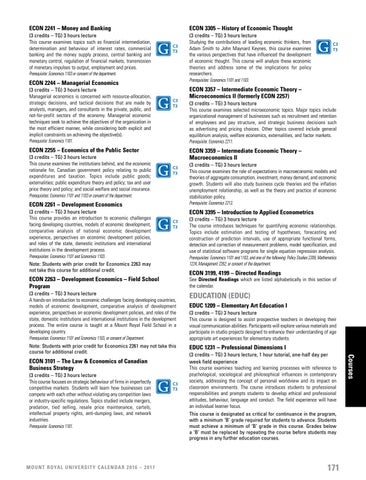ECON 2241 – Money and Banking
ECON 3305 – History of Economic Thought
(3 credits – TG) 3 hours lecture This course examines topics such as financial intermediation, determination and behaviour of interest rates, commercial banking and the money supply process, central banking and monetary control, regulation of financial markets, transmission of monetary impulses to output, employment and prices.
(3 credits – TG) 3 hours lecture Studying the contributions of leading economic thinkers, from Adam Smith to John Maynard Keynes, this course examines the various perspectives that have influenced the development of economic thought. This course will analyze these economic theories and address some of the implications for policy researchers.
C3 T3
Prerequisite: Economics 1103 or consent of the department.
Prerequisites: Economics 1101 and 1103.
ECON 2244 – Managerial Economics (3 credits – TG) 3 hours lecture Managerial economics is concerned with resource-allocation, strategic decisions, and tactical decisions that are made by analysts, managers, and consultants in the private, public, and not-for-profit sectors of the economy. Managerial economic techniques seek to achieve the objectives of the organization in the most efficient manner, while considering both explicit and implicit constraints on achieving the objective(s).
C3 T3
Prerequisite: Economics 1101.
ECON 3357 – Intermediate Economic Theory – Microeconomics II (formerly ECON 2257) (3 credits – TG) 3 hours lecture This course examines selected microeconomic topics. Major topics include organizational management of businesses such as recruitment and retention of employees and pay structure, and strategic business decisions such as advertising and pricing choices. Other topics covered include general equilibrium analysis, welfare economics, externalities, and factor markets. Prerequisite: Economics 2211.
ECON 2255 – Economics of the Public Sector (3 credits – TG) 3 hours lecture This course examines the institutions behind, and the economic rationale for, Canadian government policy relating to public expenditures and taxation. Topics include public goods; externalities; public expenditure theory and policy; tax and user price theory and policy; and social welfare and social insurance.
C3 T3
ECON 3359 – Intermediate Economic Theory – Macroeconomics II
Prerequisites: Economics 1101 and 1103 or consent of the department.
(3 credits – TG) 3 hours lecture This course examines the role of expectations in macroeconomic models and theories of aggregate consumption, investment, money demand, and economic growth. Students will also study business cycle theories and the inflation unemployment relationship, as well as the theory and practice of economic stabilization policy.
ECON 2261 – Development Economics
Prerequisite: Economics 2213.
(3 credits – TG) 3 hours lecture This course provides an introduction to economic challenges facing developing countries, models of economic development, comparative analysis of national economic development experience, perspectives on economic development policies, and roles of the state, domestic institutions and international institutions in the development process.
C3 T3
ECON 3395 – Introduction to Applied Econometrics C3 T3
Prerequisites: Economics 1101 and Economics 1103.
Prerequisites: Economics 1101 and 1103, and one of the following: Policy Studies 2209, Mathematics 1224, Management 2262; or consent of the department.
Note: Students with prior credit for Economics 2263 may not take this course for additional credit.
ECON 3199, 4199 – Directed Readings
ECON 2263 – Development Economics – Field School Program
See Directed Readings which are listed alphabetically in this section of the calendar.
(3 credits – TG) 3 hours lecture A hands-on introduction to economic challenges facing developing countries, models of economic development, comparative analysis of development experience, perspectives on economic development policies, and roles of the state, domestic institutions and international institutions in the development process. The entire course is taught at a Mount Royal Field School in a developing country. Prerequisites: Economics 1101 and Economics 1103, or consent of Department.
ECON 3101 – The Law & Economics of Canadian Business Strategy
Prerequisite: Economics 1101.
MO U NT ROYAL UNIVERSI T Y CAL E NDAR 2 0 1 6 – 2 0 1 7
C3 T3
EDUCATION (EDUC) EDUC 1209 – Elementary Art Education I (3 credits – TG) 3 hours lecture This course is designed to assist prospective teachers in developing their visual communication abilities. Participants will explore various materials and participate in studio projects designed to enhance their understanding of age appropriate art experiences for elementary students.
EDUC 1231 – Professional Dimensions I (3 credits – TG) 3 hours lecture, 1 hour tutorial, one-half day per week field experience This course examines teaching and learning processes with reference to psychological, sociological and philosophical influences in contemporary society, addressing the concept of personal worldview and its impact on classroom environments. The course introduces students to professional responsibilities and prompts students to develop ethical and professional attitudes, behaviour, language and conduct. The field experience will have an individual learner focus. This course is designated as critical for continuance in the program, with a minimum ‘B’ grade required for students to advance. Students must achieve a minimum of ‘B’ grade in this course. Grades below a ‘B’ must be replaced by repeating the course before students may progress in any further education courses.
171
Courses
Note: Students with prior credit for Economics 2261 may not take this course for additional credit.
(3 credits – TG) 3 hours lecture This course focuses on strategic behaviour of firms in imperfectly competitive markets. Students will learn how businesses can compete with each other without violating any competition laws or industry-specific regulations. Topics studied include mergers, predation, tied selling, resale price maintenance, cartels, intellectual property rights, anti-dumping laws, and network industries.
(3 credits – TG) 3 hours lecture The course introduces techniques for quantifying economic relationships. Topics include estimation and testing of hypotheses, forecasting and construction of prediction intervals, use of appropriate functional forms, detection and correction of measurement problems, model specification, and use of statistical software programs for single equation regression analysis.
